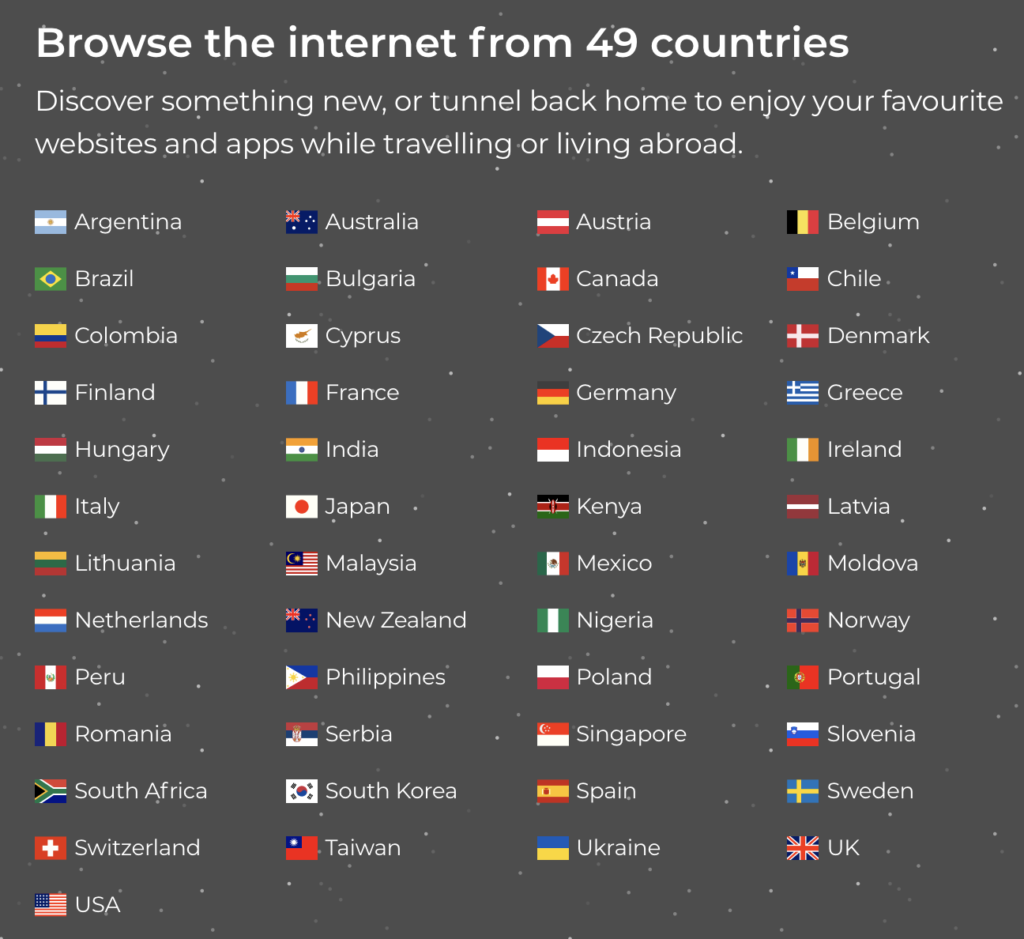WHAT’S IN THIS REVIEW?
The immensely popular TunnelBear is likely to be one of the first options to pop up on Google if you’re hoping to find a ‘free VPN’.
In reality, there’s no such thing, although they do offer a freemium tier, which is limited enough to ensure that it’s not really worth downloading.
A cap of 500MB is nothing compared to the likes of Windscribe or hide.me, who offers 10GB as long as you verify your email address.
Does the premium version of TunnelBear have any redeeming features, or would you be better served looking elsewhere?
Overview
500MB? It’s not a lot of data, especially as I was aiming to test TunnelBear’s freemium tier extensively.
As it turned out, speeds were slow enough to get an idea of what their servers had to offer, while they freely admit to being unable to unblock any streaming services.
Even so, there are some positives, including glowing third-party audits from the likes of Cure53, and strong security features.
Here’s everything you need to know about the freemium and premium versions of this VPN as we look at the service in our extensive TunnelBear review.
About TunnelBear
TunnelBear is a Canadian VPN service that was first released in 2011. They were eventually bought out by McAfee in 2018, which likely means they will now have to comply with U.S. data laws.
In any case, they’re both Five Eyes countries, and neither would be an optimal choice if you were selecting a region to HQ a VPN based solely on privacy.
McAfee also offers their own brand ‘Safe Connect’ VPN service, with TunnelBear’s network integrated into their existing tech.
At the time, Christopher Young, chief executive officer of McAfee said:
“TunnelBear has built an engaging and profitable direct-to-consumer brand, and we’re confident this acquisition will serve both our end users and partners by embedding its best-in-class, hardened network into our Safe Connect product.”
Generally, we’d be wary of any service that is owned by a company that has other VPNs in their roster, although they likely wanted TunnelBear’s expertise to improve their product, while gaining a larger percentage of market share.
In any case, there’s no mention of McAfee on the TunnelBear website, save for a blog post.
What they do have is a listed address, as well as information about various members of the team found on their About Us page.
TunnelBear is slightly more transparent than your average VPN company, although it’s not based in a great location in terms of data laws.
Pros & Cons
Here is a comprehensive list of the pros and cons that we found while using TunnelBear.
pros
The likable mascot aside, there are other traits of TunnelBear we did find impressive. We list them below:
- Software that has been independently audited on a number of occasions
- Apps for every major platform
- Free plan with a data cap of 500 MB
- Numerous additional features, including split tunneling
- Transparent business model
- Solid logging policy and strong security
cons
Through testing, we discovered a handful of disadvantages of the TunnelBear VPN service you may want to consider before purchasing:
- Poor refund policy, no money-back guarantee
- Smaller server network, with little coverage in various regions
- Based in Canada
- Slower speeds
- Tiny data cap with the free tier
- No streaming capabilities
- Lacking torrent-friendly P2P servers
- Expensive, no matter the plan
Features
TunnelBear has leaned heavily into their branding, so almost every feature has ‘Bear’ attached to the name.
Take ‘SplitBear’, otherwise known as Split Tunneling. It’s only available on Android devices, but it’s a great example of what to expect from the provider.
They don’t have the largest number of additional features, but we’ll list what they do offer below.
VigilantBear
Essentially an improved kill switch, their VigilantBear feature is; “designed to keep your location and data private in the brief seconds while TunnelBear is reconnecting. If TunnelBear loses connection for some reason (ie: you move between WiFi networks, or you’re out of network range briefly), it’s designed to automatically reconnect as soon as it detects the internet again. VigilantBear protects you in these brief seconds while TunnelBear is reconnecting.”
GhostBear
They say that GhostBear; “ makes your encrypted data less detectable to governments, businesses, and ISPs. It does this by making VPN traffic less detectable on your network, making it harder to block.”
This is done by using Obfsproxy, which was originally designed to work alongside Tor.
Free Version
The freemium version of TunnelBear is disappointing. For example, they offer just 500MB of free data per month, which was hardly enough to test connection speeds for the purposes of this review.
The cap works out to roughly 30 four-minute YouTube videos, or listening to 125 Spotify tracks.
It can be used as a means to test the service briefly, but it’s far too limited for any intensive tasks.
Pricing
- 1 Month: $9.99/mo.
- 12 Months: $4.99/mo.
- 3 Years: $3.33/mo.
We’ve mentioned the freemium version of TunnelBear, but it’s little more than a method to advertise their premium service to potential customers.
Coming in at $9.99, their one-month service is priced in line with the average VPN. Savings of 50% are available if you sign up for a year ($4.99), which increases to 66% if you commit for 36 months ($3.33). Of course, that’s still more expensive than the average budget provider. Keep in mind that we do offer deals on TunnelBear as they come through.
It’s a shame that their refund policy isn’t so clear-cut. They say:
“TunnelBear may offer refunds on a case-by-case basis. If you are unsatisfied with your purchase for any reason, you can request a refund by contacting our friendly Support Bears. As per our Terms of Service, all refund requests are subject to review.”
It’s a world away from the usual ‘no stress’ money-back guarantee offered by most VPN services. Coupled with the paltry 500MB they offer with the free tier, it’s exceptionally difficult to test the service properly without paying for an entire month.
On the other hand, they’re more than happy to continue to take your money, in the form of an ‘auto-renew policy’ which will ‘help make sure your TunnelBear is always ready to protect you’.
As for alternative payment methods, they prefer credit cards, and there was no option to pay with the likes of PayPal. Another stickler was the fact that they advertised Bitcoin heavily on their payment page, yet it was only available when purchasing a yearly deal.
Logging Policy
TunnelBear collects less information about the user than they have done previously, but it’s still not the best result in terms of anonymity.
Their ‘no logging’ claims are worded cleverly, although they begin to unravel if you take a closer look. They say:
“TunnelBear does NOT log any activity of customers connected to our service. Period. Your privacy is paramount. Find out all the grizzly details in our award-winning TunnelBear privacy policy.”
Okay, that’s fair enough. But, what do they log, according to the privacy policy?
- OS Version
- TunnelBear App Version
- Monthly Logins
- Total data used this month
It’s not the worst result, especially when you consider TunnelBear released the consumer VPN industry’s first independent, public security audit back in 2017. A further Cure53 audit was released in 2018, or the same year that they were bought out by McAfee.
A 2019 TunnelBear Security Assessment is also available on the Cure53 website.
However, the policy goes on to say; “If you pay for our services with a credit card, we do still collect your last name along with your payment information.” It’s difficult to pay via anonymous means, considering Bitcoin is only available for yearly deals.
Their 2020 Transparency Report notes:
“Since TunnelBear is located in Canada, we have to obey Canadian data laws. If we receive a subpoena, we’re obligated to respond and cooperate to the best of our ability.”
Canadian data laws are far from the friendliest when it comes to consumer rights, and it’s likely that TunnelBear will have your name, address, OS version used, and the amount of data you’ve used ready to hand over.
Speed Stats
A couple of VPN services have been able to reach my ISP’s cap of 320-380 Mbps in recent months, but the vast majority of providers will have an impact on your connection speeds while active.
It’s one of the main drawbacks of using a VPN, as it takes a while to send the data to and from your device from their servers.
Firstly, I loaded up speedtest.net so I could see what my connection was looking like, with the results seen below.
I connected to TunnelBear’s recommended location, which was found in the UK. According to the speed test, it was in Maidenhead, but that’s not particularly far away from me.
This is apparent when looking at the low ping, although download speeds of 131 Mbps are exceptionally poor compared to many modern providers. At the very least, I’d be hoping for no less than a 20% reduction.
To give you some idea of how small 500MB actually is, this simple speed test sapped the plan by over half.
Given TunnelBear can’t access streaming sites and I was down to just 203MB, I selected Japan next from their list. It might not be the fastest service, but would they be able to provide consistent speeds?
As I expected, results were dismal, clocking in at just under 60Mbps.
With 114 MB of the free plan remaining, I decided to call it a day. If speeds are especially important to you, TunnelBear’s are mediocre at best, and exceedingly slow at worst.
Server Locations & Network

Despite its popularity with users, the TunnelBear server network is small when all is said and done. It’s operational in 49 countries to be exact.
As with many providers, there’s a lack of attention paid to entire continents and vast regions, including Africa and the Middle East.
Of course, the majority of servers are found in Europe and the US, so you’ll have to look elsewhere if you’re hoping for increased coverage.
As for server numbers, I couldn’t find an exact number, which is never promising. It’s also worth noting that they’ve given up on accessing online entertainment for the time being, which indicates fewer new IPs at their disposal.
Streaming & Torrenting
Yep, Streaming is a no-go with TunnelBear. They say:
“While our Bears work tirelessly to maintain your privacy and security online, we’re unable to provide support for accessing online content (tv, movies, radio, etc). Typically, the restrictions upheld by content providers are in compliance with laws governing the geographical-restriction of copyright material. TunnelBear is unable to provide a way around those restrictions.”
It’s not a great result for the VPN, especially as the ability to bypass online restrictions is a major selling point for many premium providers.
We advise you to check out ExpressVPN or another premium alternative if you’re looking for the best service for US Netflix. (They gain access by continually buying new IPs, which are eventually blacklisted by streaming sites before the process starts again.)
As for torrenting, TunnelBear has previously blocked P2P sharing in the past to comply with relevant Canadian laws.
They appear to have softened their stance in the meantime, although there are no servers that are specifically earmarked for the task at the current time of writing.
TunnelBear is not going to be your one-stop hub for accessing entertainment, but at least they’re open and honest about their inability to do so.
Censorship
With a number of obfuscation features and a limited free plan, TunnelBear is a decent option in terms of anti-censorship.
They disabled their Hong Kong servers in 2020 to safeguard their infrastructure, recommending that users switch to Singapore and Japan following the implementation of a new Chinese security law.
In the same year, they ‘partnered with four Non-Governmental Organizations (NGO) to campaign against censorship threats which have impacted communities and activists across the world since the COVID-19 pandemic and global protests.’
To do so, TunnelBear gave away 20,000 free subscriptions.
It’s a decent result and a step further than the average provider.
Platforms & Devices
TunnelBear offers support for a small selection of devices and browsers;
You can use TunnelBear via native apps on Windows, macOS, Android and iOS devices. This is backed up by a Chrome VPN extension, Firefox VPN addon, and Opera extension.
However, it’s not the best result if you’re hoping for extensive compatibility:
“We do provide instructions for using TunnelBear on Linux, however, we only provide limited support for that platform. TunnelBear is not supported for Kindle/eReaders, Windows mobile devices, Apple/Android TV, or gaming systems. TunnelBear does not provide configurations to be used on modems/routers.”
It’s a mixed result and will be annoying for Linux users who made the mistake of buying a Windows phone.
As for the app, it’s fairly simple to use, as you just have to click on a tunnel on the map to connect to a relevant server. That’s essentially it, as you won’t find any more info or relevant stats.
This makes it great for inexperienced users, although there weren’t many options in terms of configuration. It’s easy to test out for yourself, but you will have to hand over a relevant email address to do so.
Encryption & Security
There may be no WireGuard support, but TunnelBear is transparent when it comes to their encryption and protocols, which they claim ‘were selected after extensive research and real-world performance testing’.
OpenVPN and IKEv2 are the protocols offered, with the former the only option available on the macOS device I used for testing.
AES-256-GCM is used for encryption, while data authentication will differ depending on the platform you’re using. (Windows uses ChaCha20, while Android has AES-256.)
It’s not the largest list, and there are no proprietary protocols or cutting edge tech to speak of. However, the Cure53 2019 TunnelBear Security Assessment concludes:
“To summarize, the TunnelBear complex should be seen as always trying to have an edge over its competitors when it comes to security. With this third testing round completed in November 2019, Cure53 has gathered enough evidence to attest to the changing and improving posture of the numerous TunnelBear components. Despite finding a number of vulnerabilities and miscellaneous weaknesses that can be potentially turned into vulnerabilities, the Cure53 testing team is positively surprised about the directionality and pace of secure implementations becoming a standard at TunnelBear. All in all, TunnelBear is definitely on the right path and stands out as a mature application which clearly cares about their project’s security posture and privacy of their users.”
It’s a glowing reference from one of the better-respected companies within the industry. Their 2020 report was put on hold due to the pandemic, but it will be interesting to see if results have remained positive in the meantime.
Final Thoughts
Overall, TunnelBear ranks just above average for a freemium VPN service in our book.
The VPN would receive a higher score for privacy and trust were it not for the fact that they’re based in Canada, and they’re owned by McAfee. The VPN has been audited by some of the best in the business, and have done so on multiple occasions rather than resting on their laurels.
Usability is a mixed bag, especially if you’re stuck with the unpaid version. 500MB just isn’t good enough when competitors like Windscribe can offer 20x the free data, and it’s not like TunnelBear can be used for streaming, or accessing other forms of popular online entertainment. There are various limitations that depend on the device you’re planning to use, so be wary.
The asking price is high for a one-month plan considering what’s on offer. It’s too expensive to be seen as a budget provider, but it also fails to measure up to premium VPNs in many respects. A small selection of countries is one thing, but their refund policy is a letdown for me. Take a look at our other VPN deals available today if you’re looking for more affordable options.
Lastly, speeds were fairly average. Results may vary depending on your operating system and your setup, but 130 Mbps is poor when I’m able to get 340 Mbps with no VPN connected.
TunnelBear used to be one of the biggest and best-known VPN services, possibly due to the strength of their free tier. This has waned to a degree as it struggles to compete with the crowded VPN market in 2025.
Even a few years ago, a 500MB cap wasn’t too outrageous, but average speeds continue to increase, as does the level of competition among freemium providers.
As such, we would recommend TunnelBear for light users or new VPN enthusiasts who want to explore VPN services.


